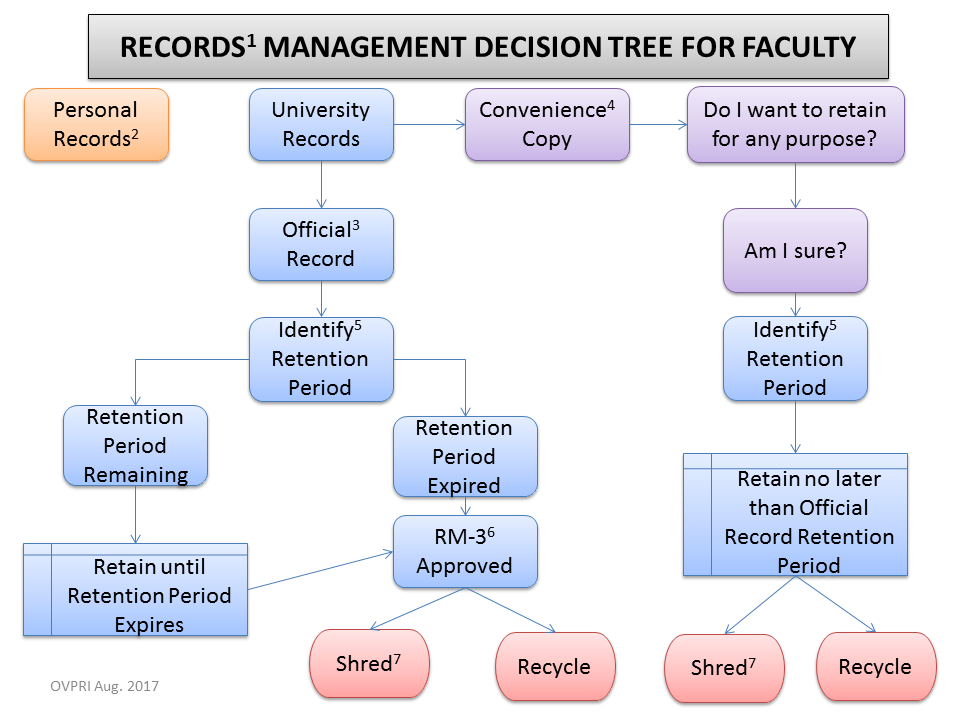Faculty Resources
Records management involves:
- the maintenance of currently active public records;
- the disposition of public records that no longer serve administrative, legal, fiscal, or historical purposes; and
- the preservation of public records that have administrative, legal, fiscal, or historical value.
1. Why should I care?
- Can save you time in the long run
- Can keep you out of trouble – liability, discoverable documents
- It is part of your job responsibilities
2. What are the basics?
- Knowing what an “official record” is and what is a “convenience copy.”
- Organizing records and understanding the retention time requirements (check annually)
- Proper destruction (deleting, shredding, recycling) of records and obtaining prior permission when required
3. What resources are available?
- VCU Records Management website
- Records Management Decision Tree for Faculty (upper right)
- Records Management FAQs
- VCU Records Management Policy
- Library of Virginia Records Management website
- Virginia Public Records Act (VPRA), Code of Virginia §42.1-76 – §42.1-91
4. Did you know?
- Files on University computers are “public records” (See Electronic Records & Imaging)
- If you use your personal email account for the transaction of any University business, that email becomes a “public record” (See Email Management)
- Retention time requirements are based on record content and not its format, such as paper or electronic.
- If a University system (RealTime, Canvas, RAMS-SPOT, RAMS-IRB) maintains the “official record,” then a duplicate or “convenience copy” of the records can be shredded or recycled without prior approval.
- For help, email the University Records Officer at recman@vcu.edu.
*Special thanks to the staff and faculty members in the Office of Research, School of Medicine, and Technology Services who assisted in the development of these records management resources for faculty.

Footnotes
- “Public record” or “record” means recorded information that documents a transaction or activity by or with any public officer, agency or employee of an agency. Regardless of physical form or characteristic, the recorded information is a public record if it is produced, collected, received or retained in pursuance of law or in connection with the transaction of public business. The medium upon which such information is recorded has no bearing on the determination of whether the recording is a public record. See Code of Virginia Sec. 42.1-77
- Any record not related to University activities, such as letters from friends, is Personal.
- If the record relates to University activities and you are the final owner of the document, then it is an Official Record. For example, your research data is an Official Record. Committee files and course records also may be Official Records.
- If the record related to University activities is maintained by someone else, you have a Convenience Copy. For example, your copies of grant proposals, IACUC protocols, gradebooks, etc. are Convenience Copies because the University maintains the Official Records. Convenience Copies must not be retained longer than the Official Record.
- To identify the Retention Period of your Official Records, see the "Records Ownership" spreadsheet. Be sure to note when the Official Records must be destroyed. Also confirm whether the records are subject to legal or other holds.
- Once the Retention Period for your Official Record has expired, complete the Certificate of Records Destruction (Form RM-3). Official Records cannot be destroyed until after the RM-3 has been approved by the VCU Records Management Office.
- If the record contains personal or potentially confidential information, such as Social Security Numbers, Shred the document.
*Special thanks to the staff and faculty members in the Office of Research, School of Medicine and Technology Services who assisted in the development of these records management resources for faculty.